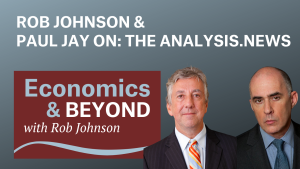If making a good model is about suppressing the things that don’t matter while focusing on what’s important, then Haldane is surely right that the omission of money and credit systems was a tremendous mistake at a time when financial-sector profits accounted for 40% of all corporate profits in the United States, as they did in 2007. The conventional economic models, as Haldane correctly points out, have missed the capacity for bubbles, booms, and busts that have a tremendous impact on the economy.
Another big part of the problem in financial modeling is the assumption of equilibrium conditions and stable expectations. These assumptions are hallmarks of the DSGE model Haldane singles out for criticism, as well as other similar approaches.
These models operate under the assumption that through the magic of backward induction we can derive stable conditions today by assuming stability at some point infinitely far in the future. But anyone who’s studied the works and writings of our most successful financiers – such as Seth Klarman, Bernard Baruch, George Soros, Warren Buffet, and others – should know that uncertainty is the defining challenge for those who succeed in the investment world. Simply put, if you’re in the business of predicting rational and stable outcomes in the financial system, then you’re not in the investment business.
The truth of these thinkers’ insights, and of those from economists such as Keynes, Hayek, and Frank Knight, whose work focused on “radical uncertainty,” is evident by a simple look at the data. Robert Schiller has shown that roughly 18% of the variance in financial market volatility can be explained by shifts in fundamentals. Clearly, expectations surrounding financial decisions are anything but stable.
And one need not look far for historical evidence of the consequences of the illusion of false certainty these models assume. Indeed, much of the bad economic thinking that led to razor-thin safety margins and contributed mightily to the financial collapse that started in 2007 was plagued by these faulty assumptions, the cost of which can be measured in trillions, if not tens of trillions, of dollars.
The instability of the present and of people’s expectation reinforces Haldane’s second concern that these very delicate and fragile financial institutions are part of a complex system that can lead non-linear outcomes like contagion that amplify instability very quickly. The recognition of the financial system’s inherent instability only serves to underline the need to provide greater buffers against risk to prevent the kind of sudden systemic collapse we faced in 2008.
The models that have ignored this fragileness and instability lost sight of the economist’s real mission: helping to create a more effective and robust economy in the service of society. Economists instead became too enamored of the assumptions in their own models and lost sight of the texture of a real-world financial sector that was becoming increasing difficult to navigate.
Haldane calls for cross-pollination with other disciplines that could provide greater context to the narrow technical expertise of economics and help economics understand how complex systems like our financial sector function. This is a development that INET supports and is helping to realize.
These developments will help return economic insight to serving the needs of society and not making a fetish of highly abstract technical models. It is for this reason that I look forward to new and exciting work, such as the forthcoming study from Anat Admati and Martin Hellwig on the proper construction of a financial system. In their eyes, the social benefit of much greater capital buffers would create a system that helps soften contagion and where the people who pay for risks are those that take the losses.
As both a policy maker at the Bank of England and intellectual leader in the field, Haldane is a vanguard thinker in the area of finance. His thoughts on the failure of finance are well worth listening to.
His question, “What have economists done for us?” is a good one, and one that economists need address. They have too often lost sight of it in favor of more abstract questions that have little relevance to the real world.
For more insight from this brilliant thinker, I would further encourage you to read Haldane’s other recent post on VoxEU called ” What is the contribution of the financial sector?”.






